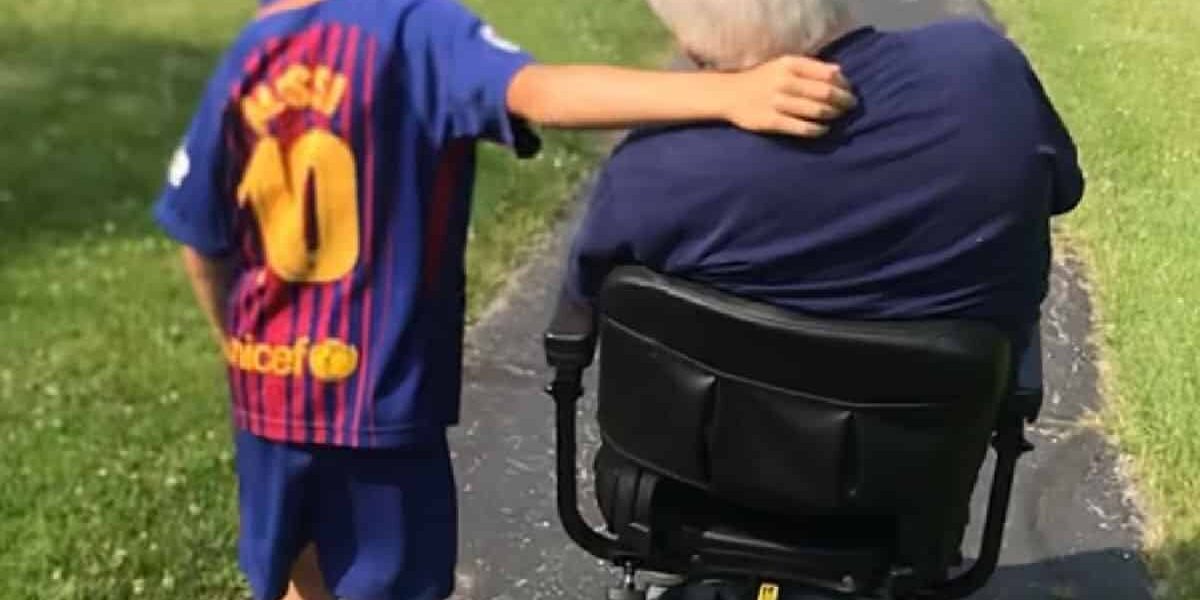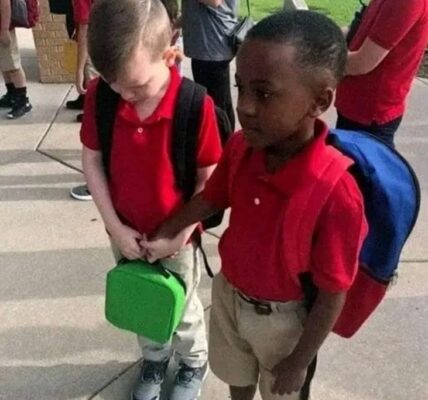
Aging has a way of reshaping people — not only those who grow older but also those who love them. My father has been living with a progressive neurological disease for decades. Time has taken its toll on his body and mind. He struggles to hear, sometimes cannot find words, and often slips into confusion. His mobility is limited, his world smaller than it once was.
Conversations with him require patience and persistence. He will sometimes latch on to a single thought — a Rolling Stones song, for instance — and circle back to it all day, unable to move past it. For many, this can be frustrating. For me, it’s a reminder of what’s been lost.
But for my nephew Riley, it has been an invitation.
From the time Riley was old enough to notice, he showed an unusual tenderness toward his grandfather. Where others might talk over him or let his silence go unacknowledged, Riley leaned in. He tapped him on the shoulder during a family conversation and asked questions directly: “Grandpa, who is your favorite baseball player?” If the question needed repeating, Riley repeated it. If it took minutes for an answer to form, he waited.
That patience was not forced. It was natural, instinctive, as though Riley understood something the rest of us had forgotten: that connection is still possible if you are willing to slow down long enough to find it.
My father has a collection of vintage car posters, framed and hung in the basement of the house. For years, unable to use the stairs, he had to settle for photographs we brought up to him — flat images of a room he once loved. But Riley wasn’t satisfied. He knew the basement held memories: ping-pong matches, long hours of tinkering, laughter echoing off the walls.
One day, Riley asked, “Grandpa, do you want to see your posters on the basement walls again?” The answer was obvious. So Riley rallied his uncles, and together they carried my father down the stairs in his wheelchair. For an hour, my dad sat surrounded by his old posters, the basement alive again with stories and memories. I don’t know whose smile was brighter that day — my father’s, or Riley’s as he watched his grandfather’s joy unfold.
These small acts of devotion are not rare for Riley. Last weekend, during a walk to a fireworks display, I hung back and watched as Riley walked alongside his grandfather’s scooter, engaging him with questions. “Did you see fireworks when you were a kid? Do you like fireworks, Grandpa?” Twenty minutes later, the two of them sat together, faces turned to the sky as bursts of color lit up the night.
As I watched, I realized how often we — the adults — slip into nostalgia. We long for who my father used to be: the man who could throw a football farther than anyone in the neighborhood, the man in bright yellow swim trunks who would dive perfectly from high cliffs. I told Riley these stories, eager for him to know the vibrant man his grandfather once was. He listened politely, but not with the intensity I expected.
Because Riley, in his wisdom, is more concerned with who his grandfather is now.
His compassion humbles me. It reminds me that understanding an aging loved one is not always convenient. It takes work and persistence. It requires acknowledging painful truths — the decline of mind and body, the losses that pile up with the years. But Riley shows us that compassion is not only about mourning what was. It’s about embracing what still is.
If I set aside my grief for a moment, I can see my father more clearly. I can bring him a cup of coffee and sit on the porch, listening to his halting words. I can ask him about that Rolling Stones song he can’t stop thinking about. I can choose to meet him where he is, instead of where I wish he still could be.
Riley has reminded me that compassion doesn’t have to be complicated. Sometimes it’s simply about showing up — asking the question again, walking beside the scooter, carrying someone down the stairs to relive old memories. Sometimes it’s about seeing the person right in front of you, as they are, and loving them all the same.
And in that, my nephew has become the teacher. He has shown me that the simplest acts — patience, presence, persistence — can be the most profound.




